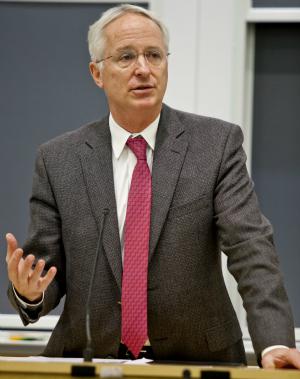Former U.S. Ambassador Speaks About the Future of the Relationship Between America, Pakistan
Cameron Munter, who served in Pakistan from 2010 to 2012, says U.S. diplomacy has focused too much on counter-terrorism.
New York, December 18, 2012—A series of diplomatically sensitive incidents and a focus on counter-terrorism objectives rather than broader development has hampered the relationship between America and Pakistan, former U.S. Ambassador and Visiting Professor Cameron Munter told a group of students and other guests at Columbia Law School.
Munter, who served as the U.S. ambassador to Pakistan from 2010 to 2012, said the relationship between the two countries is dominated by two narratives in which Pakistanis believe the United States takes advantage of their country and Americans believe Pakistan accepts aid from the United States only to betray its trust.
“When you have these kind of narratives, you’re stuck in a straitjacket,” he said in his Nov. 20 talk, “America and Pakistan: Prospects for the Relationship.”
|
|
| Former U.S. Ambassador and Visiting Professor Cameron Munter |
Those narratives were reinforced before and during Munter’s tenure by a series of high-profile military and diplomatic incidents, including the release of diplomatic cables by WikiLeaks, the Raymond Davis affair, increased U.S. drone attacks in Pakistan, the May 2011 raid that killed Osama bin Laden, and a U.S.-led NATO airstrike that killed roughly two-dozen Pakistani soldiers.
Munter described those incidents to illustrate the challenges diplomats face in their assignments.
“The way that diplomats tend to look at problems is to look at them in terms of what is effective and what is immediate,” he explained. “We have to move very quickly to make decisions based on what we think is right.”
Munter recounted the decision to go “out of channels” to reopen a supply route from Pakistan to Afghanistan. The Pakistani government had closed the route after the airstrikes that killed Pakistani soldiers in November 2011. Munter said U.S. Secretary of State Hillary Clinton “suggested we give the task to two financially trained dealmakers, Deputy Secretary of State Tom Nides and Pakistani Finance Minister Abdul Hafeez Shaikh,” who came to an agreement.
“We didn’t go to some big book and say what’s the precedent of some law,” Munter said. “We just tried everything and tried to make sure it worked.”
Despite a bipartisan plan in 2008 to build a long-term strategic relationship with Pakistan, the United States has continued to focus its efforts on the short-term goal of fighting terrorism, Munter said, which has unfortunately served to reinforce the narrative each country has developed for the other.
“When you look at Pakistan through a telescope called Afghanistan, you tend to see terrorists,” he said.
Still, Munter expressed hope that the relationship between America and Pakistan might improve in 2014 when the United States is scheduled to withdraw its troops from Afghanistan. Perhaps then, he said, the countries can focus on broader issues like economic development, regional security, and climate change.
Munter took questions from students after his presentation. He agreed with one student that Pakistanis’ mistrust of their own government is a problem for diplomacy. In the future, more of the relationship building between America and Pakistan might need to occur “out of channels,” perhaps between philanthropic groups, he predicted.
“Can we make the country more stable? Can we make it more prosperous? Can we hope to make it more democratic if we engage on a different level? I would hope so,” he said. “That is a challenge to the tradition of diplomacy, which was always state to state. Much diplomacy has to be done outside of the embassy.”
